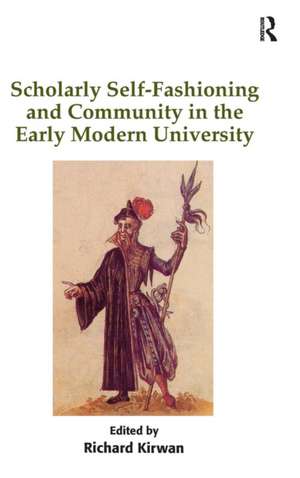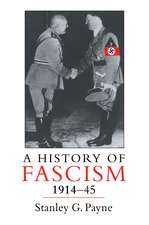Scholarly Self-Fashioning and Community in the Early Modern University
Editat de Richard Kirwanen Limba Engleză Hardback – 13 mai 2013
| Toate formatele și edițiile | Preț | Express |
|---|---|---|
| Paperback (1) | 259.51 lei 6-8 săpt. | |
| Taylor & Francis – 14 oct 2024 | 259.51 lei 6-8 săpt. | |
| Hardback (1) | 1059.45 lei 6-8 săpt. | |
| Taylor & Francis – 13 mai 2013 | 1059.45 lei 6-8 săpt. |
Preț: 1059.45 lei
Preț vechi: 1292.01 lei
-18% Nou
Puncte Express: 1589
Preț estimativ în valută:
202.75€ • 209.45$ • 168.74£
202.75€ • 209.45$ • 168.74£
Carte tipărită la comandă
Livrare economică 26 martie-09 aprilie
Preluare comenzi: 021 569.72.76
Specificații
ISBN-13: 9781409437970
ISBN-10: 1409437973
Pagini: 232
Dimensiuni: 156 x 234 x 14 mm
Greutate: 0.59 kg
Ediția:New.
Editura: Taylor & Francis
Colecția Routledge
Locul publicării:Oxford, United Kingdom
ISBN-10: 1409437973
Pagini: 232
Dimensiuni: 156 x 234 x 14 mm
Greutate: 0.59 kg
Ediția:New.
Editura: Taylor & Francis
Colecția Routledge
Locul publicării:Oxford, United Kingdom
Public țintă
AcademicNotă biografică
Richard Kirwan is a Lecturer in History at the University of Limerick. His main research interests lie in the social and cultural history of early modern universities, early modern elites, and print culture. His first monograph, Empowerment and Representation at the University in Early Modern Germany: Helmstedt and Würzburg, 1576-1634, was published by Harrassowitz in Kommission in 2009.
Cuprins
Introduction Scholarly Self-Fashioning and the Cultural History of Universities, Richard Kirwan; Chapter 1 The Ideal Student: Manuals of Student Behaviour in Early Modern Italy, Jonathan Davies; Chapter 2 Academic Exchanges: Letters, the Reformation and Scholarly Self-Fashioning, Kenneth Austin; Chapter 3 Johannes Eck (1486–1543): Academic Career and Self-Fashioning around 1500, Ingo Trüter; Chapter 4 From Individual to Archetype: Occasional Texts and the Performance of Scholarly Identity in Early Modern Germany, Richard Kirwan; Chapter 5 A Struggle for Nobility: ‘Nobilitas literaria’ as Academic Self-Fashioning in Early Modern Germany, Marian Füssel; Chapter 6 The Social Metaphysics of Professors: Divine Providence, Academic Charisma and Witchcraft, Andreas Corcoran; Chapter 7 The Idolater John Owen? Linguistic Hegemony in Cromwell’s Oxford, Gráinne McLaughlin; Chapter 8 Irish Student Identity at the University of Paris: A Case Study, Jason Harris;
Recenzii
'All these chapters in this very fine book of essays focused on cogent examples of early modern European academic self-fashioning. All authors utilized good to excellent sources on academics and professors in German, French, and English universities. This volume is an essential read for all students of early modern European social history.' Sixteenth Century Journal 'This extremely interesting collection of essays draws on a wide range of theories about the idea of self-fashioning to explore how it functioned in both an individual and a collective sense in the early modern university. It is the careful use of theory, illuminating without being pretentious, and the wide range of sources sensitively used ... that make the volume methodologically convincing and useful for future research. ... This book is of enormous relevance to all who are interested in the history of universities, and also has far-reaching implications for such study in other periods.' Renaissance Quarterly ’...a worthwhile contribution to the history of universities and represents one more way in which Greenblatt’s concept of self-fashioning can be applied to early modern history.’ Journal of Early Modern History
Descriere
A greater fluidity in social relations and hierarchies was experienced across Europe in the early modern period, a consequence of the major political and religious upheavals of the sixteenth and seventeenth centuries. During this time university scholars demonstrated a great energy when characterizing themselves socially as learned men. This book investigates the significance and implications of academic self-fashioning throughout Europe in the early modern period. It describes a general and growing deliberation in the fashioning of individual, communal and categorical academic identity in this period. It explores the reasons for this growing self-consciousness among scholars, and the effects of its expression - social and political, desired and real.





